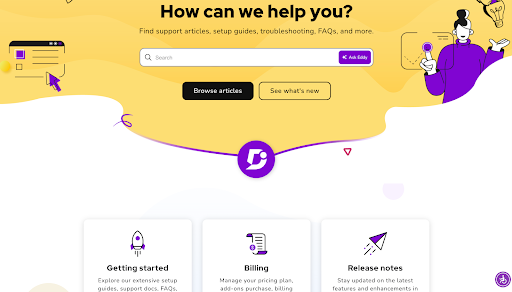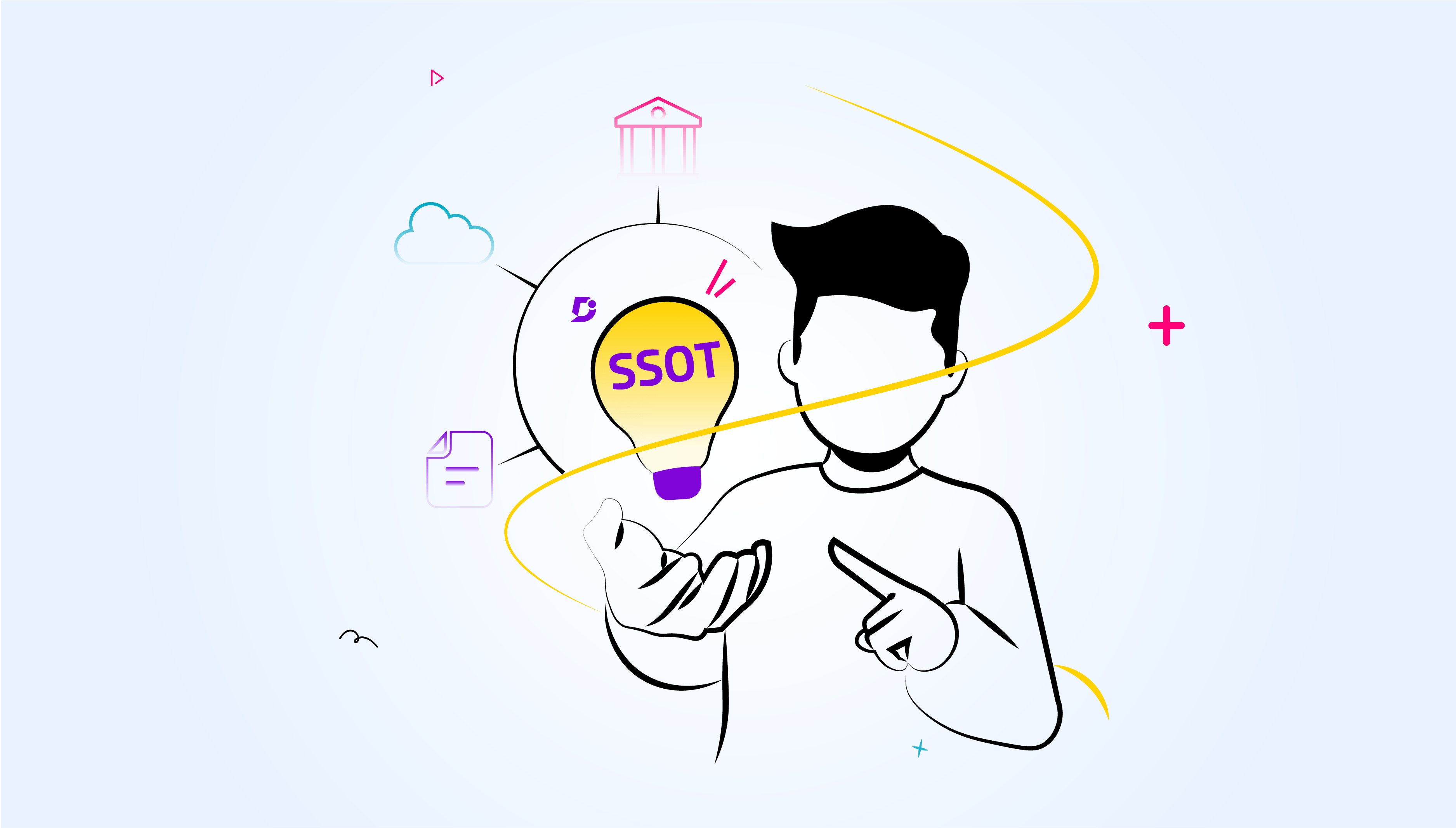According to you, what is the one thing that can lead your product-based organization towards success?
It is the team’s knowledge that deeply understands your product offering.
Product knowledge becomes more essential if you are a SaaS company. Software products are often complex, and when your team knows the smallest details and shares them with your potential customers, it can be a solid deal-maker.
Now that you also agree that product knowledge is the magic potion that solves customer queries, the question arises of creating a system to share the product knowledge with your team.
And here is where product knowledge training comes in.
Companies that provide comprehensive product training to their sales teams experience a 79% increase in sales volumes compared to those that do not. (Sales Management Association)
Did we pique your interest?
Keep reading this ultimate guide to product knowledge training as we cover all about it. Let’s get started
What Is Product Knowledge Training?
Product knowledge training equips your team with in-depth knowledge of your product. It is the process of educating your workforce about the product, features, benefits, solutions, use cases, and most importantly how it can solve the customer’s problem.

A key to organizational success, as you and we now agree, is a deep understanding of a company’s product offerings. This is true for all teams across an organization, be it
- Customer Success
- Marketing
- Recruiting
- Product
- Sales
Companies are 17% more productive and 21% more profitable when they offer training to engaged employees.
Your employees become product experts and evangelists when they truly understand your company’s products. It empowers not only your workforce but also your customers, as when they understand your product’s benefits and find maximum value in your offerings, your customers automatically become your referrals.
On the surface, it might seem simple enough, but it is only when you deep-dive you understand how important and complex product knowledge training can be.
Why is Product Knowledge Training Important?
Your employees need to understand thoroughly how your product works. Without in-depth knowledge, they will have a harder time convincing your potential customers and lead to even trying your product.
Product knowledge training helps in
- Boosting employee confidence
- Increasing customer trust
- Gaining a competitive edge
- Enhancing customer service and satisfaction
When you think about product training, you think about the sales, marketing, and customer support teams. However, product knowledge training should not be limited to only these three departments, but they tend to be at the center of it as these are the teams that regularly interact with your customers.
Product knowledge training considerably affects and benefits everyone involved in the business process, from employees to customers.
What are the Key Benefits Of Product Knowledge Training?
Besides empowering your teams by strengthening their product communication and boosting their confidence, product knowledge training has multiple other benefits.
- Enhanced Product Knowledge
The training sessions demonstrate your products’ features and benefits for your employees to learn and understand.
Once your employees become product experts, they can achieve greater results when they promote, sell, or use the product. Also, it can help them to handle any queries thrown at them in a better way.
- 24/7 Access To Product Information
Recalling a piece of not-so-common information can be tough, no matter how well-trained an employee is.
That’s where an internal knowledge base helps your employees self-learn about the product, its propositions, features, and benefits. You can categorize content in your knowledge base and create handbooks for employees across the departments.
Having a 24×7 accessible knowledge base for your employees helps them retrieve information as and when needed.
- Empowering Your Sales Rep
Your sales rep might be a rockstar, but if they don’t have good knowledge about your particular product, then their skills are not so useful for your business.
A product knowledge training program can help your sales rep increase their knowledge about your product and sharpen their skills and techniques to sell it well. Training your sales team to access the knowledge base during training sessions will help them get hands-on quick product information and save training time.
- Reduced Cost of Training
Educating your employees on the problems they are solving, how they differ from your competitors, and how better they can serve your customers helps keep the employees engaged and more invested in your company.
The more invested your employees are, the more motivated they are, and it is more likely your customers choose you over your competitors. So, the more precise, detailed information you provide to your employees, the less it will cost you in the long run.
- Long-Term Customer Relationships
When your business turns potential into a customer, you wish to build a long-term relationship with them. And this happens when the customer is happy and satisfied with your fantastic product and your excellent team.
When your employees have a thorough knowledge of your product, they can provide your customers with excellent support. It could lead to lower customer queries, faster ticket resolution, and higher customer satisfaction, all important aspects of building a long-term relationship with your customer.
- Drives Ideas and Innovation
When your employees understand your product so well, they also understand what new additions can add more value to your product and your customers.
This can lead to more cohesion among team members, empowering them to ideate and innovate, leading to the growth of not only the product but also the employees.
- Fosters Brand Advocacy
If your employees don’t understand your product well, your customers won’t ever. And if your employees do, they will find the maximum potential of your product.
When you train your employees to offer them product knowledge and a free hand to discuss your product with passion, it infuses enthusiasm in your employees, making them your brand advocate.
However, implementing product knowledge training sessions or programs requires a strategic approach. The first step of which is to identify the type of product knowledge training needed for different departments and roles.
Schedule a demo with one of our experts to take a deeper dive into Document360
Book A Demo
Different Types Of Product Knowledge Training for Different Teams
Now that you have established how crucial product knowledge training is for your company let us take a look at how it can be conducted and how it works for different teams.
1. Offline
Instructor-led training (ILT) has always been a popular way to inform and train employees, as there is direct communication between the instructor and the trainees. However, you need the entire team to be together in one place at a set time.
2. Online
Online training has become the norm. With the workforce going remote, the session can be accessible anytime from anywhere. A modern Knowledge Management System can help you create online training programs to share the in-depth details of your product. This works extremely well for SaaS companies that have built software to solve a specific problem, whether it is for B2B or B2C.
3. Synchronous
For synchronous training, you need to gather all your people in one place, and they take the training at the same time. It can be done through offline sessions, video conferencing, or an online session.
4. Asynchronous
With asynchronous training, you give your employees training material in the form of hard or soft copy and set a deadline so they can choose the time and study at their own pace.
5. Blended Learning
It is usually a mix of ILT and self-paced learning sessions as companies use the best of both- face-to-face learning sessions and self-learning.
To maximize the effectiveness of the training program, you will need to set custom objectives and segmented courses for each team. Because each team has its focus area, each would have a different way of viewing, engaging, and interacting with customers.
Product Knowledge Training For Sales Reps
Your sales team has one goal- to sell the product. For that, they need to have crucial information that helps them close more and more deals. Also, the better they know your product, the better they can guide your potential customers.
The objective is to provide your sales team with
- Price
- ROI
- USP
- Usage
- Roadmap
- Use cases
- Competitors
- Customer Success Stories
Product Knowledge Training For Customer Support
Your support team is the one your customer goes to when they have even a slight issue with your product. Besides the complete knowledge base, your customer support team must be aware of all the ongoing and upcoming changes.
The objective is to provide your customer support team with
- Resources to help solve customer queries
- Create a good customer experience
- Answer frequently asked questions
- Use the product efficiently
- Update on the product
- Help retain customers
Product Knowledge Training For Customers
Don’t be surprised. Your customers should also get product knowledge training. However, it needn’t be as insightful and deep. According to Webincare, a study showed that with a customer education program in place, bottom-line revenue was increased by 6.2%, customer retention by 7.4%, and support costs decreased by 6.1%.
The objective is to provide your customers with
- Onboard and educate them about the product
- Effectively use, navigate, and promote
- Best practices
Product Knowledge Training For Marketing
The primary goal of your marketing team is to spread brand awareness, create quality content seamlessly across channels, and generate leads. When they understand your product and its target audience well, they can promote it well.
The objective is to provide your marketing team with
- Product Overview
- Features and Benefits
- Product propositions
- Target audience
- Pain points
- Competitors analysis
Product Knowledge Training For Developers
It is your developer team that will manage the smooth running of your product, making it awesome and user-friendly with every new code they add. When your developers receive all the inside knowledge, they can add to the innovation, fix issues, and
The objective is to provide your developer team with
- Technology stack
- Upcoming features
- Internal documentation
- Bugs and other issues
- Quality assurance process
- Ensuring the smooth running
Product Knowledge Training For Human Resources
Your HR department is also your talent acquisition department. How will they convince great talent to join your organization if they don’t understand your product well? They are, after all, the first point of contact for new hires.
The objective is to provide your human resource team with
- Product Overview
- Features and Benefits
- The problem it solves
- Unique selling point
- Number of customers
Check out, How Safebreach Transformed Product Knowledge Training with Document360:
Methods for Effective Product Knowledge Training
With a defined process like product knowledge training, telling your team about your product can be quite easy. However, if you want the training sessions to bring maximum results, we suggest you continue reading and take a look at these tips
1. Establishing a Consistent Training Program
Learning isn’t something most would enjoy spending their time on. And it is also not possible for you to make every topic interesting. So what do you do?
- Establish a consistent training program that is easy to understand and access.
- Make it self-paced so employees can decide how much time they want to give.
- Use different engaging practices such as games, quizzes, and bite-sized materials.
2. Automation of Time-Consuming Workflows
When you automate workflows such as scheduling training sessions or tracking the progress of employees, you not only free up your resources but also
- Ensure training material and processes are consistent.
- Collect data on employee performance and engagement.
- Reduce the risk of outdated information as updates can be quickly implemented.
3. Flexible Training Approaches
One size does not fit all. By having a flexible training approach, you can have the best of all training types to suit employees. A flexible learning approach helps in ways such as
- Some may prefer visual learning, while some may enjoy text-based.
- They can access the material and resources whenever needed.
- It facilitates continuous learning, feedback, and assessment.
4. Build a Great Knowledge Base
A great training program should ensure easy access to all the information, and building a self-service knowledge base can add value
- Store an endless amount of product knowledge for employees and customers.
- It is available 24/7 and can be used quickly to find information or solve queries.
- Can be used to learn about the product or use it as a reference.

5. Set Goals and Evaluate Your Program
When you have clear goals and objectives it is easy to measure and evaluate the efficiency of your program. By setting goals you ensure
- Your program is useful and targets the areas you want to train in.
- Tweak the training program according to your employee feedback.
- As the product evolves, so can the training program and its goals.
Also Read: How to Write Product Manuals?
Wrapping Up
Imparting your employees with product knowledge is crucial, especially if you are in the SaaS industry. If employees have incomplete knowledge about the product, it will affect all aspects of your business. Simply put, the success of your business is highly reliant on product knowledge training.
However, it can be difficult without the right tools.
That’s where the modern AI-powered knowledge base tool, like Document360, steps in.
With Document360 you can create, edit, and publish articles in a more structured way. You can store the product information centrally and share restricted access with your employees depending on their roles. It also offers version control features so you can update the information with recent updates and keep track of all the changes.
With AI assistance, Eddy helps the readers to quickly interact and land on more relevant information and the Article summarizer helps readers if they want to save time by not reading lengthy articles. Instead, they can read a piece of condensed article information as a summary thus making the learning journey more efficient.
Make your employees more effective in their tasks and your customers happier and more satisfied. Take this step towards building a team of product enthusiasts.




 –
– 

